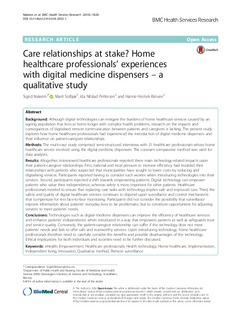| dc.contributor.author | Nakrem, Sigrid | |
| dc.contributor.author | Solbjør, Marit | |
| dc.contributor.author | Pettersen, Ida Nilstad | |
| dc.contributor.author | Kleiven, Hanne Hestvik | |
| dc.date.accessioned | 2018-01-23T10:17:44Z | |
| dc.date.available | 2018-01-23T10:17:44Z | |
| dc.date.created | 2018-01-22T10:36:20Z | |
| dc.date.issued | 2018 | |
| dc.identifier.issn | 1472-6963 | |
| dc.identifier.uri | http://hdl.handle.net/11250/2478981 | |
| dc.description.abstract | Background
Although digital technologies can mitigate the burdens of home healthcare services caused by an ageing population that lives at home longer with complex health problems, research on the impacts and consequences of digitalised remote communication between patients and caregivers is lacking. The present study explores how home healthcare professionals had experienced the introduction of digital medicine dispensers and their influence on patient-caregiver relationships.
Methods
The multi-case study comprised semi-structured interviews with 21 healthcare professionals whose home healthcare service involved using the digital medicine dispensers. The constant comparative method was used for data analyses.
Results
Altogether, interviewed healthcare professionals reported three main technology-related impacts upon their patient-caregiver relationships. First, national and local pressure to increase efficiency had troubled their relationships with patients who suspected that municipalities have sought to lower costs by reducing and digitalising services. Participants reported having to consider such worries when introducing technologies into their services. Second, participants reported a shift towards empowering patients. Digital technology can empower patients who value their independence, whereas safety is more important for other patients. Healthcare professionals needed to ensure that replacing care tasks with technology implies safe and improved care. Third, the safety and quality of digital healthcare services continues to depend upon surveillance and control mechanisms that compensate for less face-to-face monitoring. Participants did not consider the possibility that surveillance exposes information about patients’ everyday lives to be problematic, but to constitute opportunities for adjusting services to meet patients’ needs.
Conclusions
Technologies such as digital medicine dispensers can improve the efficiency of healthcare services and enhance patients’ independence when introduced in a way that empowers patients as well as safeguards trust and service quality. Conversely, the patient-caregiver relationship can suffer if the technology does not meet patients’ needs and fails to offer safe and trustworthy services. Upon introducing technology, home healthcare professionals therefore need to carefully consider the benefits and possible disadvantages of the technology. Ethical implications for both individuals and societies need to be further discussed. | nb_NO |
| dc.language.iso | eng | nb_NO |
| dc.publisher | BioMed Central | nb_NO |
| dc.rights | Navngivelse 4.0 Internasjonal | * |
| dc.rights.uri | http://creativecommons.org/licenses/by/4.0/deed.no | * |
| dc.title | Care relationships at stake? Home healthcare professionals' experiences with digital medicine dispensers - a qualitative study | nb_NO |
| dc.type | Journal article | nb_NO |
| dc.type | Peer reviewed | nb_NO |
| dc.description.version | publishedVersion | nb_NO |
| dc.source.volume | 18 | nb_NO |
| dc.source.journal | BMC Health Services Research | nb_NO |
| dc.source.issue | 26 | nb_NO |
| dc.identifier.doi | 10.1186/s12913-018-2835-1 | |
| dc.identifier.cristin | 1548931 | |
| dc.description.localcode | © The Author(s). 2018 Open Access This article is distributed under the terms of the Creative Commons Attribution 4.0 International License (http://creativecommons.org/licenses/by/4.0/) | nb_NO |
| cristin.unitcode | 194,65,20,0 | |
| cristin.unitcode | 194,61,45,0 | |
| cristin.unitname | Institutt for samfunnsmedisin og sykepleie | |
| cristin.unitname | Institutt for design | |
| cristin.ispublished | true | |
| cristin.fulltext | original | |
| cristin.qualitycode | 2 | |

